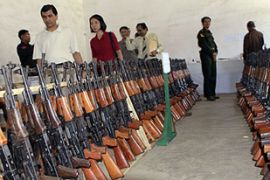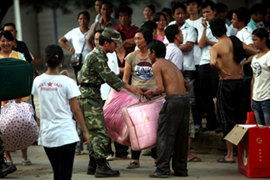China tip-off ‘sparked’ fighting
Myanmar says northeast clashes began after Beijing identified illegal arms factory.

During the visit, Brigadier Phone Swe, Myanmar’s deputy home affairs minister, said that Chinese officials informed them about the factory during a ministerial meeting on combating transnational crime.
Phone Swe’s comments appeared to be an attempt to show that relations with close China remained on a steady keel, after a rare public request from Beijing that Myanmar calm the situation which had led to the influx of refugees.
Economic ties
China has maintained close economic and diplomatic ties with Myanmar’s military government, largely estranged from the West, ensuring China’s access to its mineral wealth.
Michael Vatikiotis, the regional director for the centre of humanitarian dialogue, said that the area had become a strategic concerns for China.
|
“They [China] have made it very clear to the Myanmar authorities that the want to see stability” Michael Vatikiotis, regional analyst |
“One of the reasons for their concern is that they have just signed and prepared for the construction of oil pipelines that run from the coast of Myanmar up to the border and across to Yunnan,” he told Al Jazeera from Singapore.
“They have made it very clear to the Myanmar authorities that the want to see stability.”
However, Vatikiotis said that Beijing was unlikely to throw its weight behind the ethnic Chinese over the border in Myanmar.
“I think that is not very much in character with China which is a great respecter of sovereignty, I think what they have been supporting until now is the status quo.”
Earlier, the Myanmar government had said that the fighting had begun after ethnic Chinese raided a police checkpoint and took 39 police officers hostage.
Full-scale fighting broke out after 15 of the hostages were killed, and according to state media in Myanmar the clash left 11 soldiers and eight ethnic Chinese rebels dead.
Myanmar officials have claimed that calm has been restored in Kokang but many refugees remain unconvinced.
Election agreement
Meanwhile, the new leader of an ethnic Chinese political group said he would participate in general elections next year, the first in nearly two decades.
The issue of whether to take part in elections has been a point of contention among ethnic groups, which are being asked to put down their weapons and join the government-controlled border guards.
 |
| Fighting has forced some 30,000 refugees to flee across the border into China [AFP] |
Phe Sauk Chen, the head of the new Kokang Region Provisional Leading Committee, which was formed after other local leaders fled, told reporters during Tuesday’s trip that his group also agreed to join the government’s border security guards.
So far the larger ethnic groups, including the Kachin and the Wa, which has a militia estimated at more than 20,000 fighters, have refused to take part in elections.
But the issue caused division and led to the resignation of five senior leaders from the Kachin Independence Organisation earlier this month.
Aung Din, executive director of the US Campaign for Burma [the country’s former name], said the leaders planned to take part in the polls.
Critics have called the scheduled elections a sham designed to cement the military’s grip on power. The Kokang were the first among 17 armed ethnic groups to reach a peace agreement with the government in March 1989.